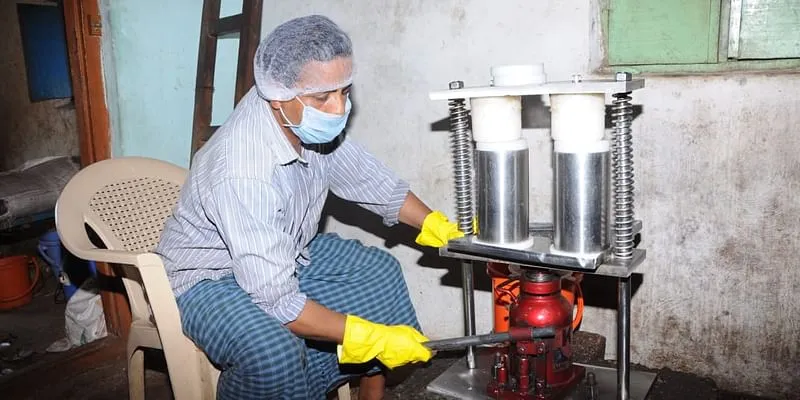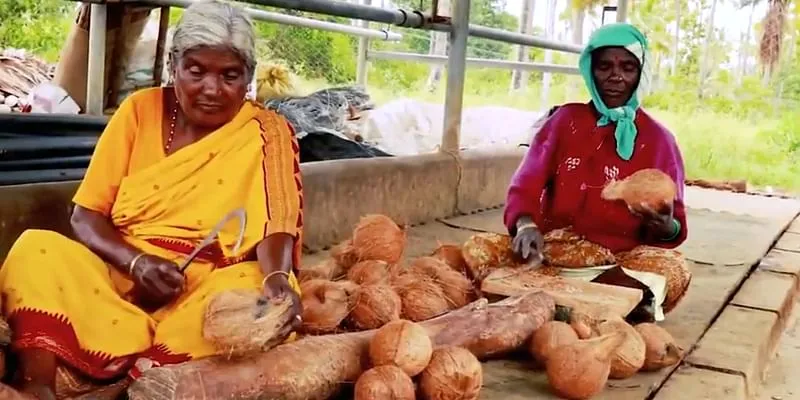Son of a farmer, this entrepreneur launched a coconut products company to bring stability to farmers
Tengin was launched in 2017 by Madhu Kargund who grew under the shade of coconut trees. The company manufactures coconut products such as oil, soap, and candles using traditional methods.
Coconuts have been a part of southern India’s agrarian industry for as long as one can remember. Having grown up under the shade of coconut trees, Madhu Kargund, son of a farmer, remained deeply attached to his roots. His company Tengin, which translates to coconut in Kannada, is aimed towards uplifting the community of farmers, and is the perfect example of being vocal for local.

Madhu Kargund, Founder of Tengin
The story of Tengin
Madhu hails from a small region called Arsikere in the Hassan district of Karnataka. Belonging to a farming family, Madhu spent his childhood learning about coconuts.
Reminiscing the old days, he tells SMBStory, “I used to spend a lot of time in the coconut farm helping my father pick and gather the coconuts. For many decades, selling coconuts in our village have provided us all with an income, and they also have multiple health benefits. This is where my journey with Tengin began.”
When he grew up, Madhu realised that the condition of farmers was dismal. He also realised that farming was not giving them a sustainable livelihood, and many people were abandoning agriculture altogether and migrating to other cities in search of livelihood.
Three problems that Madhu particularly identified were the lack of a stable income, no takers for the produce, and no avenues for upskilling for farmers.
Since coconut is present in abundance in the southern parts of the country and Madhu grew up around them, he saw a business opportunity that could also be leveraged for the benefit of the farmers.
“The idea was to create and manufacture coconut products in the village from our produce, add value to it, maximise profits, and empower farmers in the village,” he says. Tengin was founded in 2017.
The Bengaluru-headquartered company is a coconut-centric brand that makes coconut products like virgin coconut oil, chips (fried in coconut oil), bowls made out of coconut shells, soaps, and much more.
The brand uses traditional methods to manufacture these products with the help of villagers and locally sourced coconuts. Madhu doesn't want to disclose the turnover but adds there are approximately ten categories of products which are priced between Rs 100 and Rs 850.

Combating challenges and competition
Madhu, an engineer by profession, faced numerous challenges in the initial stages of building the business. Initially, he says it was a big challenge to convince farmers to work with him. He also had to invest a huge amount in marketing.
“People didn’t know about virgin coconut oil. So I had to explain to them the benefits of this oil,” he says, adding, “There are a lot of big players in the industry who can crush us anytime.”
Other brands in the market that Tengin competes with include Cocosoul and Maxcare.
Madhu adds that the company is determined to take the traditional route in manufacturing the products because some technological methods remove the nutrients from the coconuts, thus reducing their nutritional value. The traditional cold press technology is used to extract the oil, which is then packaged by farmers. The final products are collected in Bengaluru and sold from there.
The candles, soaps, and bowls are handcrafted by women.
Madhu also says that through Tengin, they want to bring in greater transparency by introducing coconut-tourism by taking customers to the fields and give them an experience of how products out of coconuts are produced.

Coconut farmers at work
Business model and future plans
The company, which has been bootstrapped till now, is looking at raising funds to expand.
The brand is present in 20 stores in Bengaluru and three stores in Mysore. The company is also listed on ecommerce platforms such as Amazon, Community Farm, and . Recently, it started exporting to Singapore as well.
The COVID-19 outbreak and the subsequent lockdown posed some disruptions for the business as everything was completely shut down, but the company plans to venture in the Mumbai market in the next few months. Madhu also adds that three more manufacturing plants will be set up by farmers by 2021.
Edited by Kanishk Singh









